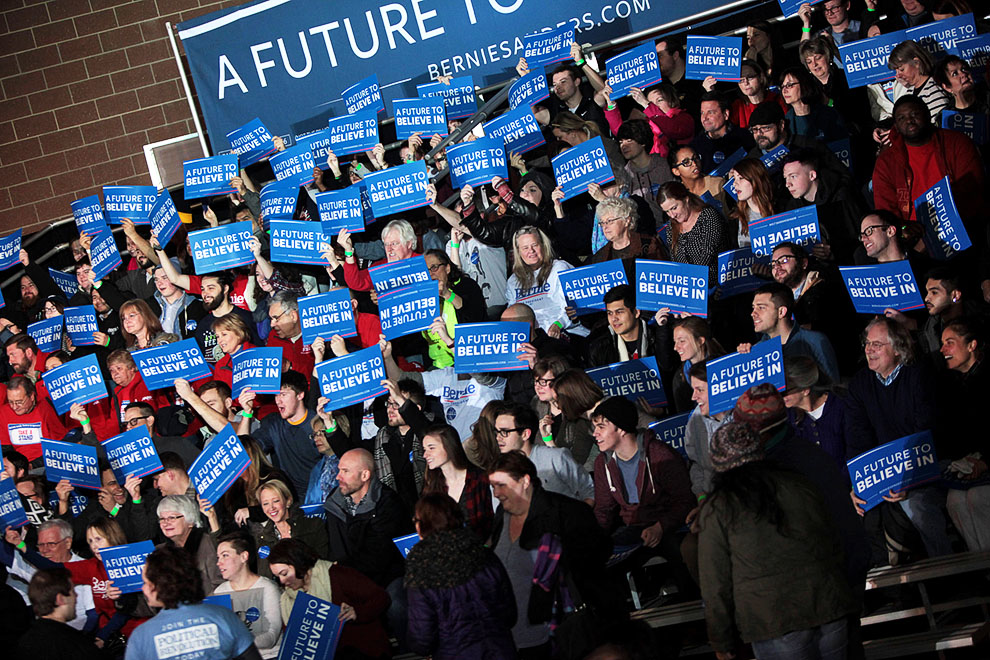On Sunday this week the Canberra Times ran a front-page story, with supporting video footage online, alleging that taxpayer-funded Labor Party “operatives” were campaigning for Bernie Sanders in the United States – and breaking US electoral laws in the process. Labor’s national director, George Wright, has promised to investigate the possible breach of US law, but that leaves unanswered the question of why the Australian government is paying for Labor volunteers to work on Bernie Sanders’s campaign in the first place.
The answer lies in the Australian Political Parties for Democracy Program introduced by the Howard government in 2005. Under the APPDP, the Liberal and Labor parties each receive $1 million per year (and, since 2011, the Greens $200,000 per year) for work that contributes to “strengthening democracy internationally.” Despite that program aim, though, only 50 per cent of the funds must be spent in developing democracies. Funds have been used to pay for subscriptions to international bodies such as the Socialist International or the International Democratic Union, for example, and for travel expenses to attend their meetings.
The International Democratic Union is the international body for over eighty centre-right parties, including the US Republicans and the British and Canadian Conservative Parties. Its meetings enable party leaders to exchange election-winning techniques and strategies. John Howard was elected IDU chairman in 2002 – three years before his government created the APPDP – and served in this capacity for twelve years.
In 2009 the Australian National Audit Office issued an adverse report on the program, finding insufficient accountability in its administration by the Department of Finance and no requirement that the money be spent on the purposes outlined in funding applications. The Audit Office found that only 44 per cent of the funds (rather than the minimum of 50 per cent) had been spent in countries targeted for development assistance; another 36 per cent had been spent in countries such as Britain and the United States, or on non-country-specific activities; and 20 per cent had been spent on administrative costs and subscriptions to international organisations.
As a result of the audit, the program was shifted from the Department of Finance to AusAID in 2009. But the controversy continued: disclosure returns from the political parties to the Australian Electoral Commission appeared to show that money was being spent out of the aid budget on paying party officials to travel business class to meetings of fraternal political parties, particularly in North America or Europe, or to meetings of their international bodies. The AusAID funds were also being used to pay part of a senior Labor Party official’s salary.
The outcry over this use of taxpayer funds resulted in an announcement that the program had been scrapped as part of the Abbott government’s cuts to the aid budget in 2014. Interestingly, however, “negotiations” over the program soon led to its being reinstated, this time back in the finance portfolio.
Finding the APPDP in the finance department’s 2015–16 portfolio budget statement is difficult. No spending line corresponds to the program, and the only mention is among the services provided under the ministerial and parliamentary services program. A “key deliverable” of this program is the “management and support of the approved Political Party Programmes within the entitlement framework.”
It seems very odd that the APPDP is described as a “key deliverable” yet no information is provided on its funding. Late last year I asked the finance department officer responsible for managing the program where I could find the budget line relating to it. My inquiry was passed on to the department’s media centre, which responded on 7 December 2015 that “the budgeted expenses for APPDP fall under administered expenses. It is incorporated in the ordinary annual services (Appropriation Bill No 1) budget. Details about the expenditure under the current APPDP deeds are not available publicly.”
Paradoxically, one of the aims of the APPDP is to “encourage representative, accountable, inclusive and transparent democratic political parties.” Only the Greens admit to its existence, on their Global Greens website, and outline how it has been used.
Contrast this secrecy with the relative transparency of overseas equivalents such as the German political foundations, funded by the Federal Ministry for Economic Cooperation and Development. In the 1980s, revelations that the German foundation funds were being used as a source of domestic party finance instead of democracy assistance led to a Greens-initiated Constitutional Court challenge. As a result, the system was strengthened and the Greens incorporated, as they have been in Australia. A renewed court challenge was mounted in 2012 by Germany’s small Ecological-Democratic Party but rejected in August 2015 by the Constitutional Court.
There is nothing wrong in principle with providing funding to political parties to undertake international work, particularly in our region. The development of strong political parties and effective party competition is widely recognised as a measure of democracy, and our parties can contribute to that process. But there is everything wrong with the secrecy and lack of accountability of this program, and the efforts of different governments to keep it out of the public eye. •




